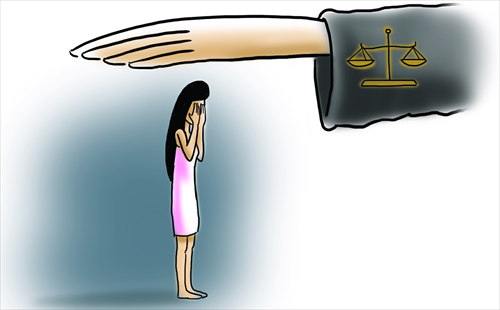Public can’t make up for institutional failings

Illustration: Liu Rui/GT
The Chinese Internet was roiled this month by the latest viral video to depict grim indifference to the sufferings of others; a tape showing a young woman, now known by the pseudonym "Wanwan," being assaulted in a hotel in Beijing as onlookers do nothing. Like the video of the tragic death of Wang Yue, a toddler run over by a truck and left to die by passers-by, in 2011, the tape caught at the consciences of netizens who wondered why nobody interfered. When Wanwan reported that she'd been met by bleak indifference from the hotel staff, the local police, and the website through which she'd booked her stay, public anger rose further.
All the institutions involved have now apologized. But apologies alone aren't enough. Unless the attitudes of institutions shift in fundamental ways, the callousness and fear that prevents people from helping others in need will never shift, and China will remain a country of "bad Samaritans."
Worries about indifference aren't new, or unique to China. The murder of a young woman, Kitty Genovese, in New York in 1964 caused a wave of breast-beating about social indifference and the alienation of crowds after it was wrongly reported that 38 people had witnessed the murder and done nothing. Careful investigation later showed that the facts were very different, but the case nonetheless tapped into a deep anxiety that the US was becoming a place where people didn't help others.
Yet public indifference is learnt. When institutions don't respond to public needs, when police dismiss women's reports of assaults or rapes, when corporations treat crimes on their property as an inconvenience to be covered up rather than as a spur to action, ordinary people can't be expected to take up their burdens. The chief reason why people don't interfere in crisis situations in China isn't because of hard-heartedness, but out of a genuine fear that once bigger forces get involved, they may become victims themselves.
In this case, it's an open secret that Chinese hotels are often centers for prostitution, often with the collusion of the local police - who have sometimes been the best clients. The anti-corruption campaign has cracked down on some of this, but it's still common for any man travelling alone to receive calls from prostitutes working with the hotel. I don't think there's anything wrong with sex work, but there's a lot wrong with the attitudes police have toward sex workers, who have almost no protection from being assaulted by customers and are often the victims of criminal trafficking. Wanwan, according to the latest police statement, fell victim to assumptions that this was a quarrel between a pimp and a prostitute - something that, too often, the police don't interfere in.
I've intervened in a couple of assaults in the UK. But I was able to do that in the knowledge that, if I was hurt, the NHS would treat me for free, that if the police got involved they would listen fairly to my account of events, and that the attackers weren't shielded by larger forces or interests. (It helps a lot here that I am a very large white man.) Ordinary Chinese citizens don't have those guarantees.
The case has drawn attention to the newly passed Domestic Violence Law, the first of its kind in China. Plenty of Chinese have been in the position of hearing a violent domestic assault next door and feeling like they could do nothing about it. This law theoretically changes that, putting domestic violence on the agenda for police. But unless the police actually respond to charges and enforce the law, instead of, as has usually been the case, dismissing it as "private concerns," attitudes won't change.
Plenty of attention has been given to singling out "good Samaritans" and praising those who help others. But single cases alone aren't enough. There has to be a consistent, good-faith effort to do the right thing. At the public security level, this can be achieved through far greater training, rather than relying on young, uneducated staff to deal with complex issues. At the corporate level, corporations, which are fundamentally self-interested groups, need to have a realistic fear of both official intervention and civil recourse through the courts from ordinary people they fail. When it comes to helping others, individuals can't be expected to make up for the failures of institutions.
The author is a Global Times editor. jamespalmer@globaltimes.com.cn